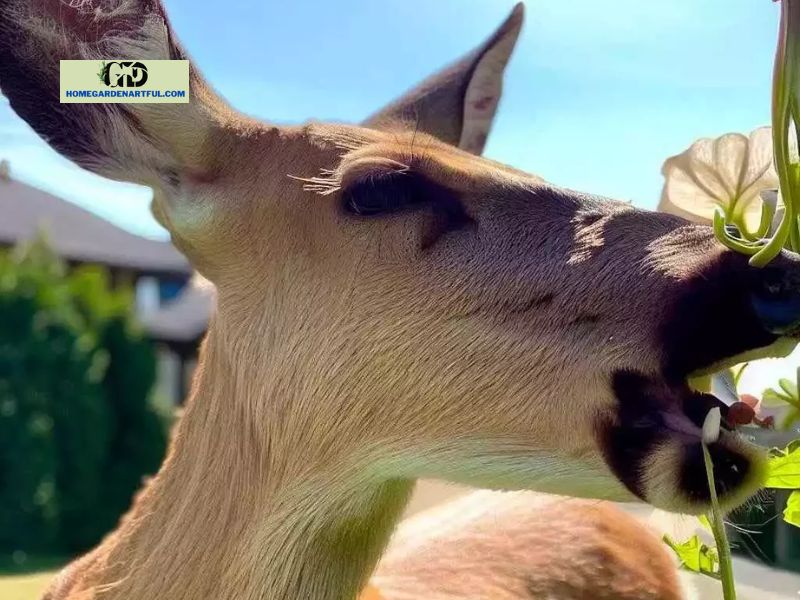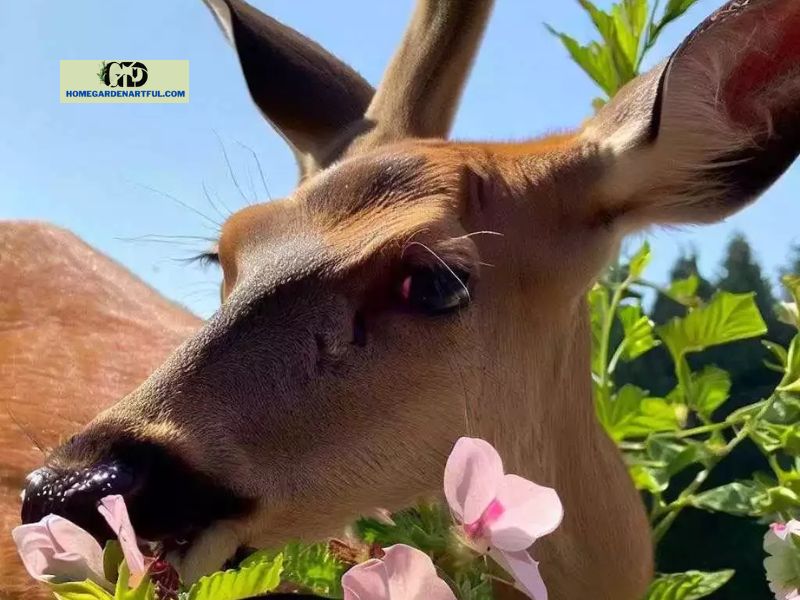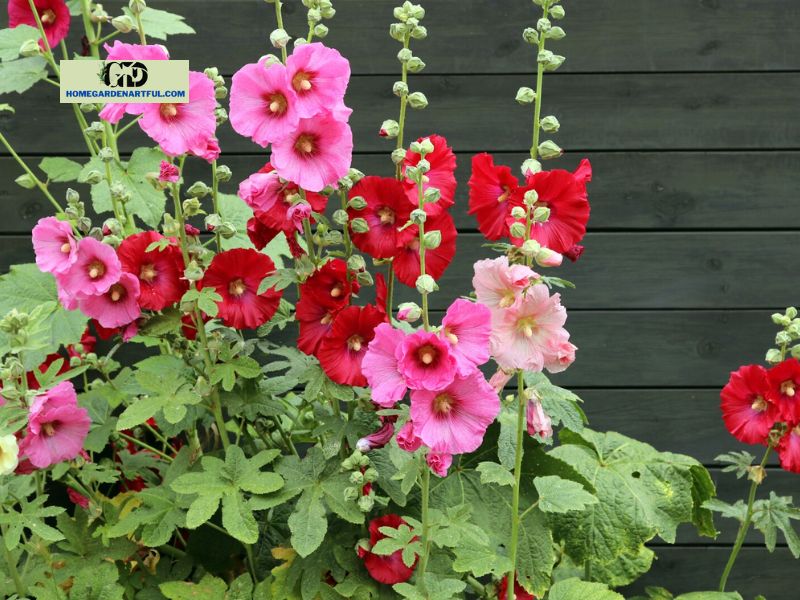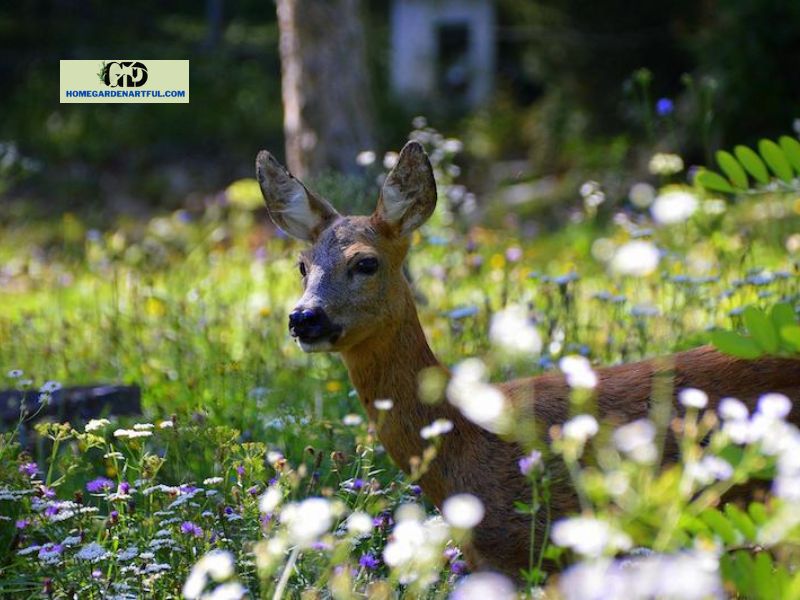Do Deer Eat Hollyhocks? Who can blame deer for enjoying hollyhocks? These towering blossoms are not only delicious but also high in nutrients. What you need to know about deer and hollyhocks is as follows:
These lovely blooms are mallow family members, which means they are connected to cotton plants. Deer find them enticing, owing to their sweetness and nutritional value. A single hollyhock flower can have up to 15% sugar content. Hollyhocks are high in vitamins A and C, as well as minerals including potassium and calcium, in addition to being a healthy source of calories.
Do Deer Eat Hollyhocks? Why do deer consume hollyhocks? Because they are delicious! However, there is more to it than that. Because these tall blooms grow in open regions with plenty of sunlight, they provide an easy way for deer to acquire their daily dose of vitamin D (which aids in calcium absorption). Discover at homegardenartful.com!
Do Deer Eat Hollyhocks?

For one thing, hollyhocks are high in elements that deer require in their diet. They’re notably high in protein, which is necessary for strong muscles and healthy antlers. The leaves are also high in phosphorus, calcium, and potassium, all of which aid in maintaining bone and tooth strength. Furthermore, the nectar in hollyhock blossoms serves as a source of energy.
But it’s not just nourishment; hollyhocks simply taste wonderful to deer! They love the sweet flavor of the blooms and will often consume the entire plant, roots and all! This can be frustrating for gardeners who wish to grow these lovely flowers (deer will even eat early seedlings), yet it’s all part of the natural cycle.
The nutritional value of hollyhocks for deer
Hollyhocks are a lovely addition to any garden, and they’re also beneficial to the wildlife that visits your property. Hollyhocks are popular among deer and provide numerous nutritional benefits. Here are a few of the reasons why you should grow hollyhocks for deer:
Protein is abundant in hollyhocks. This is critical for the development of fawns and the health of adult deer.
Vitamin C, calcium, potassium, magnesium, phosphorus, iron, and zinc are all vital vitamins and minerals that assist in strengthening the immune system.
Hollyhock leaves are high in roughage, which assists in keeping the digestive system healthy.
What kind of hollyhocks do deer prefer?

Here’s a list of the numerous sorts of hollyhocks that deer enjoy eating:
- Alcea rosea: This is the most common hollyhock, and it’s also one of the most delicious! These pink or white flowers are popular among deer.
- Althaea cannabina: Also called a “hemp-leaved marshmallow”, this hollyhock has fuzzy leaves as well as purple flowers. It’s not as sweet as Alcea rosea, yet it’s still tasty to deer.
- Malva sylvestris: If deer prefer something sweeter, this is another nice alternative. Typically, the blossoms are pink or purple in color.
The most effective approach to feeding hollyhocks to deer
Giving them a variety of fresh stems, leaves, and blossoms is the best method to feed them. You can also mix in some fruits and veggies. Here are some ideas for making deer food:
Make little pieces of fresh hollyhock stems, leaves, and blossoms. If desired, add some diced carrots, apples, or other fruits and vegetables.
Put the mixture in a basin or container that Deer can easily access. Consider placing a huge container on top of a chair or table so the
Deer do not have to strain themselves looking for the food inside.
Where do deer consume hollyhocks?
The blooms blossom in the spring and summer, giving them an excellent source of food for deer during these seasons. Hollyhocks grow in fields, along roadsides, and in other open spaces. Deer will devour your hollyhocks if they are grown on your land.
Are hollyhocks poisonous to deer?

Hollyhocks are not poisonous to deer.
Hollyhocks are high in minerals and vitamins that deer require, such as potassium, vitamin A, and magnesium.
Hollyhock leaves are abundant in fiber, which helps deer digestive systems work properly.
How can I keep deer from eating hollyhocks?
It’s that time of year again when the hollyhocks blossom and the deer are on the search for a good meal. While these lovely flowers may be enticing to our canine companions, there are a few things you can do to keep them from becoming supper. Here are a few pointers to keep hungry deer away from your hollyhocks:
- Plant hollyhocks in a confined space, such as a chicken-wire-fenced garden.
- Add a deer repellent to the hollyhock leaves and stems. The most effective repellents have a strong odor, like garlic or onion.
- Cover hollyhocks with a net or another physical barrier to keep deer away from the blossoms.
- If you have hollyhocks growing in your yard, avoid attracting deer by throwing food or waste out.
- Spray the plants with a solution of water and vinegar; the unpleasant flavor may repel deer.
- Make your own spray repellent by combining water with garlic cloves or spicy peppers.
- With a little effort, you can enjoy blossoming hollyhocks without fear of deer eating them.
Can young deer consume hollyhocks?
Yes, young deer can consume hollyhocks.
- Hollyhocks are a good source of minerals and vitamins, which contribute to keeping the baby deer healthy.
- Hollyhocks are easy to digest – Because baby deer have sensitive stomachs, it’s critical that they eat foods that won’t irritate their stomachs. Fortunately, hollyhocks were the ideal choice.
- Hollyhocks taste delicious – Let’s face it, if something tastes good, baby deer are more inclined to consume it. And there’s no denying that hollyhock leaves are delectable.
Conclusion
So, Do Deer Eat Hollyhocks? I’ve never seen a deer turn down a hollyhock. Hollyhocks are generally regarded as a safe plant to keep nearby because they do not poison deer or other animals. They’ll eat the entire plant, especially the roots. However, if deer consume hollyhocks on a regular basis, they can harm the plants and prevent them from blossoming. If you are not careful, this can be very damaging to your garden.


